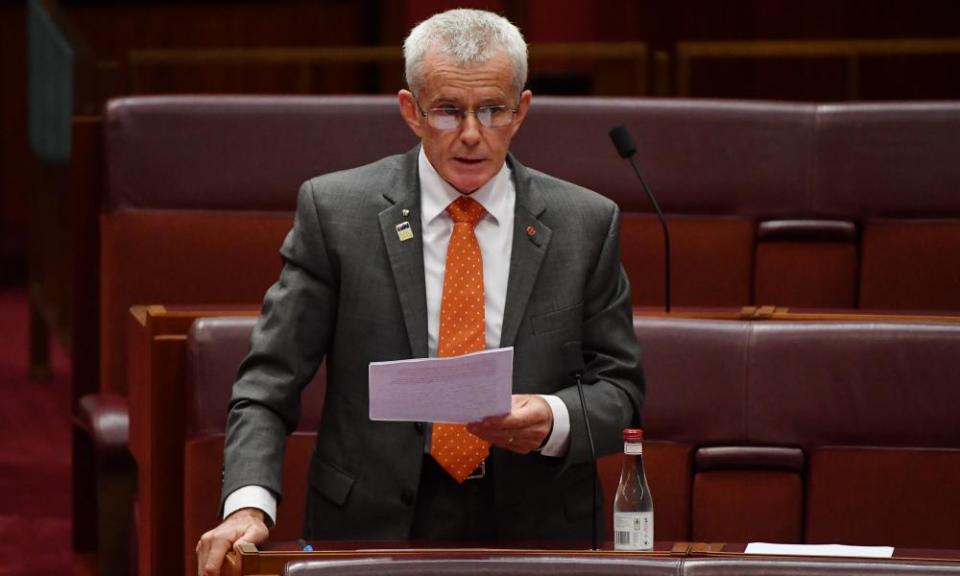‘Cruel mess’: One Nation puts Coalition on notice over industrial relations

Malcolm Roberts has accused the Morrison government of failing to fix the “cruel mess” of casual employees missing out on entitlements such as annual leave despite working regular, permanent hours.
In comments to Guardian Australia, the One Nation senator put the Coalition on notice that it should not seek to “block fair pay and entitlements for casual workers” in its upcoming industrial relations omnibus bill.
The comments follow a fiery appearance at Senate estimates on Monday, in which Roberts accused the attorney general’s department of providing “inflammatory and wrong” evidence about the effect of a recent federal court decision on misclassified casuals.
Related: Christian Porter signals industrial relations changes but rules out small business award
In the Rosatto case, the mining union successfully challenged labour hire company, WorkPac, who hired “casual” workers on long-term rosters to pay them lower rates than permanent workers, who had the benefit of union-negotiated agreements.
In the full federal court the attorney general, Christian Porter, intervened on the side of Workpac by arguing that if a court finds a casual employee is in fact a permanent worker then employers should be able to deduct the 25% loading for casuals from their backpay claims for unpaid entitlements such as annual leave.
Employers feared the decision could lead to an avalanche of backpay claims, which the department estimated could cost up to $40bn.
The case is currently on appeal to the high court, where Porter will again side with the employer. The government has also unsuccessfully tried to stop so-called “double dipping” through regulation in the past.
Asked if One Nation could block the omnibus bill if it sought to prevent similar backpay claims, Roberts replied: “I have put the Morrison government on notice that we don’t want them to be the next group to block fair pay and entitlements for casual workers.”
“You can be assured that I will stand up for what is right and fair for everyday Queenslanders and Australians,” he told Guardian Australia.
“How can I have faith in the proposal from a government that has yet to fix this huge and sometimes cruel mess that has impacted thousands of honest workers?”
In the hearing, Roberts said the Rosatto decision “doesn’t apply to every casual employee” as claimed by the department but only those who have been “abused” by being misclassified as casuals.
He also questioned whether the pandemic was “the right time to be making sweeping changes to industrial relations”.
“I am confident that employers who have paid their casual workers the correct rates and honestly managed them as casuals will have nothing to be concerned about,” he told Guardian Australia.
“All of this is because the Morrison government and the Fair Work Commission, Fair Work Ombudsman and union bosses sat back and did nothing for years.”
Without One Nation’s two Senate votes, the Coalition could struggle to pass an industrial relations bill. In November, the minor party stunned the government by combining with Labor, the Greens and Jacqui Lambie to block its bill increasing penalties on unions for industrial law breaches.
Porter has been formulating an industrial relations reform bill since talks between employers and unions broke down in September after the Business Council of Australia sided with unions on a streamlined process to approve workplace pay deals.
Related: Sally McManus cites 'concerning signs' government is prepared to support pay cut reforms
According to Nationals backbenchers Matt Canavan and George Christensen, Porter has assured them the omnibus bill will address “the uncertainty around the meaning of casual employment and an employee’s ability to access casual conversion”.
On Monday departmental officials confirmed the yet-to-be-released bill will include an objective definition of casual employees and an improved mechanism to allow them to convert to permanent employment.
The Australian Council of Trade Unions has warned that there are “concerning signs” the government is poised to side with employer groups calling for reforms that would cut take-home pay, including allowing part-time workers to do overtime hours without penalty rates.
The government aims to introduce the bill by the end of the year after further consultation, a timeline departmental officials conceded was “tight”.

